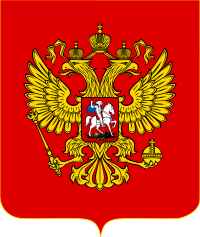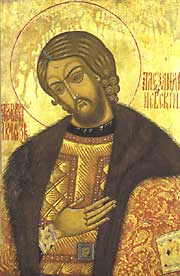Mikhail Fradkov
| Mikhail Fradkov Михаил Фрадков |
|
.jpeg) |
|
|
|
|
|---|---|
| Incumbent | |
| Assumed office 6 October 2007 |
|
| President | Vladimir Putin Dimitry Medvedev |
| Preceded by | Sergei Lebedev |
|
|
|
| In office 5 March 2004 – 14 September 2007 |
|
| President | Vladimir Putin |
| Preceded by | Viktor Khristenko |
| Succeeded by | Viktor Zubkov |
|
|
|
| Born | September 1, 1950 Samara, Russian SFSR, Soviet Union |
| Nationality | Jewish |
| Political party | No affiliation |
| Spouse(s) | Elena Ludenko-Fradkova |
Mikhail Yefimovich Fradkov (Russian: Михаи́л Ефи́мович Фрадко́в; born September 1, 1950) is a Russian politician and statesman who was the Prime Minister of Russia from March 2004 to September 2007. Fradkov currently is the head of Russia's Foreign Intelligence Services.
Contents |
Early life
Fradkov was born near the city now known as Samara in a family of Jewish origin. [1] He studied at both the Moscow Machine Tool Design (станкоинструментальный) Institute (graduated 1972) and the Foreign Trade Academy (graduated 1981). In 1973, he was posted to the economic section of the Soviet Union's embassy in India, where he remained for two years. He later held several positions back in Russia. In 1991, he was Russia's representative to General Agreement on Tariffs and Trade (GATT) in Geneva.
Political career
In late 1992, Fradkov was appointed Deputy Minister for Foreign Economic Relations. Less than a year later, in October 1993, he became First Deputy Minister for Foreign Economic Relations. On April 15, 1997, a presidential decree by Boris Yeltsin appointed Fradkov Minister of Foreign Economic Relations and Trade, a post which he kept for nearly a year. In the middle of 1999, another presidential decree made him Minister of Trade.
He was made director of the Federal Tax Police by Vladimir Putin in 2001, having previously been Deputy Secretary of the Security Council. In 2003 he was made Russia's representative to the European Union. On March 1, 2004, he was nominated by Putin as the next Prime Minister, and this appointment was approved by the Duma on March 5.
Fradkov's nomination as Prime Minister was a surprise to many observers, as he was not seen as part of Vladimir Putin's inner circle. Some commentators, such as the Carnegie Moscow Center's Lilia Shevtsova, have speculated that his "outsider" status might have been an important factor in his nomination, saying that Putin selected him as someone who was "not a representative of any of the warring clans" in the Kremlin. Former Prime Minister Sergei Stepashin, whom Fradkov has served under, called Fradkov "absolutely independent from any sort of political clan or group." Putin and his allies have praised Fradkov as experienced, professional, and honest.
In December 2004 Fradkov was named Person of the Year (Expert magazine) by Expert magazine, influential and respected Russian business weekly.
On May 12, 2004, Fradkov was appointed Prime Minister for the second time, as Vladimir Putin had won the presidential election and been inaugurated on May 7. See also Mikhail Fradkov's Second Cabinet.
On September 12, 2007 Fradkov announced his resignation to President Putin, which Putin accepted, nominating Viktor Zubkov as Fradkov's successor.[2] Putin bestowed an award on Fradkov and said that he would remain in office until the confirmation of a successor by the Duma. [3] Zubkov was confirmed on September 14.[4]
On October 6, 2007 president Putin announced that he would appoint Fradkov as head of the country's Foreign Intelligence Service.[5]
Fradkov's appointment as head of the Foreign Intelligence Service, combined with his service in India, are suggestive of a KGB background. This calls into question earlier assumptions that he was an "outsider" in Kremlin circles and provides an explanation for Putin's trust in him.[6]
References
- ↑ C. Lev Krichevsky, "Russian Jew named prime minister brings out Jewish pride — and anxiety", JTA, March 2, 2004.
- ↑ Nabi Abdullaev, "Fradkov Quits, Replacement a Surprise", The Moscow Times, Issue 3742, September 13, 2007, Page 1.
- ↑ C. J. Chivers, "Putin Shuffles Government, Posing Mystery", The New York Times, September 13, 2007.
- ↑ Michael Binyon, "Viktor Zubkov confirmed as Russian PM", The Times (UK), September 14, 2007.
- ↑ "Russian Foreign Intelligence"
- ↑ Andrei Soldatov, "The Re-agent", Novaya Gazeta, October 11, 2007.
External links
- Biographies of the Fradkov Cabinet
- Renaissance Capital Research Portal "The New Government"
- The Carnegie Moscow Center
| Political offices | ||
|---|---|---|
| Preceded by Viktor Khristenko (acting) |
Prime Minister of Russia 2004 – 2007 |
Succeeded by Viktor Zubkov |
| Government offices | ||
| Preceded by Sergei Lebedev |
Director of Foreign Intelligence Service (Russia) 2007 – present |
Succeeded by Incumbent |
|
||||||||||||||||||||
|
|||||||||


.jpg)